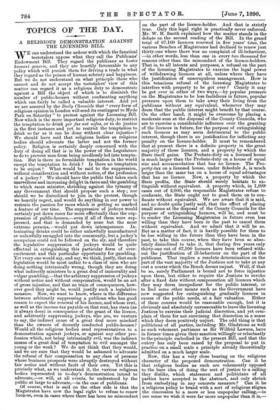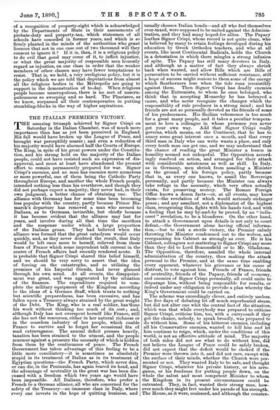TOPICS OF THE DAY.
A RELIGIOUS DEMONSTRATION AGAINST THE LICENSING BILL.
W.N1 can understand. the ardour with which the fanatical teetotalers oppose what they call the Publicans' Endowment Bill. They regard the publicans as hostes humani generis, and they are heartily favourable to any policy which will punish them for driving a trade in what they regard as the poison of human sobriety and happiness. But we do not understand. on what principle those who cannot and do not accept the teetotalers' view of this matter can regard it as a religious duty to demonstrate against a Bill the object of which is to diminish the number of public-houses without confiscating anything which can fairly be called a valuable interest. And yet we are assured by the Daily Chronicle that "every form of religious opinion in London will send its contingent to Hyde Park on Saturday" to protest against the Licensing Bill. Now which is the more important religious duty, to restrict the temptation to drink per fas aut nefas, or to do justice in the first instance and yet to restrict the temptation to drink so far as it can be done without clear injustice ? We should have said that religious bodies as religious bodies should advocate the latter and not the former policy. Religion is certainly deeply concerned with the duty of doing all that is in the power of the Legislature to do to prevent men from being needlessly led into tempta- tion. But is there no formidable temptation in the world. except the temptation to drink ? Is there no temptation to be unjust ? What would. be said. to the suppression, without consideration and without notice, of the profession of a jockey ? We should. have the public that takes such marvellous and increasing delight in races and the gambling to which races minister, shrieking against the tyranny of any Government that should propose such a step ; nor should we be disinclined. to join in the protest, though we heartily regret, and would do anything in our power to restrain the passion for races which is getting so marked a feature of our time. The suppression of jockeys would certainly put down races far more effectually than the sup- pression of public-houses,—even if all of them were sup- pressed, and that is demanded by none but the most extreme persons,—would. put down intemperance. In- toxicating drinks could be either unlawfully manufactured or unlawfully smuggled into the community, but a jockey's occupation could not be followed on the sly, and. therefore the legislative suppression of jockeys would be quite effectual in extinguishing this particular form of over- excitement and this particular opportunity for gambling. Yet every one would. say, and say, we think, justly, that such legislation would. be most unfair to a class of men who are doing nothing intrinsically wrong, though they are doing what indirectly ministers to a great deal of immorality and vulgar gambling,—that the arbitrary suppression of jockeys without notice and without compensation, would. be an act of gross injustice, and that no train of consequences, how- ever good they might be, would justify such a legislative measure. Now, we want to know, where is the difference between arbitrarily suppressing a publican who has good. reason to expect the renewal of his licence, and. whose rent, as well as the income-tax payable on that rent, has risen (as it always does) in consequence of the grant of the licence, and arbitrarily suppressing jockeys, who are, we venture to say, the indirect cause of a great deal more mischief than the owners of decently conducted public-houses ? Would. all the religious bodies send representatives to a demonstration against jockeys, or against any other pro- fession which, not being intrinsically evil, was the indirect means of a great deal of temptation to evil amongst the young or the weak ? We do not think that they would, and, we are sure that they would be ashamed to advocate the refusal of fair compensation to any class of persons whose business prospects were abruptly destroyed without fair notice and without fault of their own. Yet this is precisely what, as we understand it, the various religious bodies represented. in to-day's demonstration intend to advocate,—or will, at all events, be understood by the public at large to advocate,—in the case of publicans. Of course, what is said on the other side is that the Magistrates have now the legal right to refuse to renew licences, even in cases where there has been no misconduct on the part of the licence-holder. And that is strictly true. Only this legal right is practically never enforced. Mr. W. H. Smith explained how the matter stands in the debate on the second reading of the Bill. In the grand total of 67,100 licences renewed in five years' time, the various Benches of Magistrates had. declined to renew just thirty-one where there was no complaint of ill-behaviour, —in other words, less than one in every two thousand for reasons other than the misconduct of the licence-holders. That is, to all intents and purposes, a refusal on the part of the licensing Magistrates to exercise the legal power of withdrawing licences at all, unless where they have the justification of unscrupulous management. How is this tenacious refusal of the licensing Magistrates to interfere with property to be got over ? Clearly it may be got over in either of two ways,—by popular pressure on the Magistrates to be less fastidious in future, popular pressure upon them to take away their living from the publicans without any equivalent, whenever they may deem that the public interest might benefit by that course.. On the other hand, it might be overcome by placing a, moderate sum at the disposal of the County Councils, who are to exercise a considerable influence over the granting- of the licences in future, for the purpose of extinguishing such licences as may seem detrimental to the public interest, though there is no justification for inflicting any penalty on the licence-holder. It must be remembered that at present there is a definite property in the great majority of these licences, and a property by which the State itself gains. The Probate-duty on a licensed house is much larger than the Probate-duty on a house of equal size and accommodation that has no licence. The Pro- perty-tax on a licensed house, under Schedule A, is much larger than the same tax on a house of equal advantages that has no licence. Now, a property by which the State profits, the State should surely hesitate to ex- tinguish without equivalent. A property which, in 1,999 cases out of 2,000, the responsible Magistrates refuse to confiscate, the State ought not to goad them on to con- fiscate without equivalent. We are aware that it is said,. and no doubt quite justly said, that the effect of placing small sums at the disposal of the County Councils for the purpose of extinguishing licences, will be, and must be to render the Licensing Magistrates in future even lesa willing than they have been in the past to cancel them without equivalent. And we admit that it will be so. But as a matter of fact, it is hardly possible for them to. be less willing in the future than they have been in the past, to take this course, when they have been so abso- lutely disinclined. to take it, that during five years only thirty-one out of 67,100 licences have been refused with- out the justification of ill-behaviour on the part of the publicans. That implies a resolute determination on the part of the vast majority of the Justices not to take at any cost a course which the Bench deems unjust. Well, if that be so, surely Parliament is bound not to force injustice upon them, but either to require the Justices to revoke after a fixed. date without compensation all licences which they may deem inexpedient for the public interest, or to find some other means such as the Government have now suggested for extinguishing gradually licences in excess of the public needs, at a fair valuation. Either of these courses would be reasonable enough, but it is obviously and. absolutely unreasonable to leave the licensing Justices to exercise their judicial discretion, and yet com- plain of them for not exercising that discretion in a sense which they deem positively unjust. The odd thing is that politicians of all parties, including Mr. Gladstone as well as such vehement partisans as Sir Wilfrid Lawson, have in former times given their sanction willingly or reluctantly to the principle embodied. in the present Bill, and that the outcry has only been raised by the proposal to put in practice on a small scale a principle already theoretically admitted on a much larger scale. Now, this has a very close bearing on the religious character of the proposed demonstration. Can it be that religious bodies as such are vehemently opposed to the bare idea of doing the sort of justice to a calling they dislike, which statesmen and. politicians of all parties have accepted in the abstract, and. only shrink from embodying in any concrete measure ? Can it be a religious policy to brand. with a sort of religious stigma. the concession to a more or less unpopular calling,—in one sense we wish it were far more unpopular than it is,— of a recognition of property-right which is acknowledged by the Departments of State in their assessments of probate-duty and property-tax, which statesmen of all schools have conceded in former years, and which is so firmly planted in the minds of the authorities who grant licences that not in one case out of two thousand will they consent to ignore it ? If it is, then, it is a religious policy to do evil that good may come of it, to inflict injustice, or what the great majority of responsible men honestly regard as injustice, on one class in order that the weaker members of other. classes may have fewer temptations to resist. That is, we hold, a very irreligious policy, but it is the policy which we are told that deputations from almost all the religious bodies in the Metropolis are going to support in the demonstration of to-day. When religious people become unscrupulous, there is no sort of unscru- pulousness so sweeping and so hard. The Pharisees, as we know, surpassed all their contemporaries in putting stumbling-blocks in the way of higher aspirations.





































 Previous page
Previous page